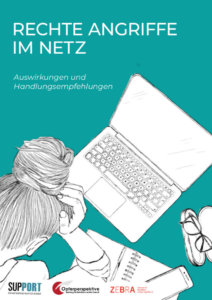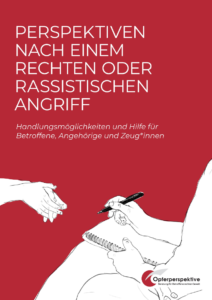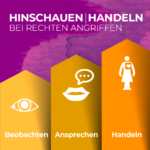What do we mean by right-wing violence?
Right-wing violence is based on the false assumption that certain social groups are worth less than others. Those affected include refugees, migrants, Jewish people, Muslim people, Sinti and Roma, political opponents, the homeless, people with disabilities, LGBTQ+ people, Black people, people of colour, punks, leftist and anti-fascists, and other groups of people who are devalued in right-wing world views. Those affected are not attacked because of their personalities or for something they have done. For the perpetrators, being perceived as belonging to one or more of the devalued groups is the motive for the attack. It doesn’t matter whether these assumptions are correct or not.
Right-wing violence has many manifestations. It can be a physical attack, a threat, bullying, coercion or targeted damage to property. Right-wing agitation and hostility on the Internet are also part of this. In addition, there are other examples that those affected experience as violent. The victims’ perception is the key aspect to us when rating an act as right-wing violence. As a counselling centre, we support you in classifying situations and with processing what you have experienced. We take the following steps with you, and we advise you on possible strategies for action.
A right-wing attack – what now?
A right-wing attack usually comes as a complete surprise to those affected. Many feel overwhelmed during and after the situation and do not know how to deal with what has happened. This is why we have compiled some recommendations for action here. We explain what you can do if you experience right-wing violence yourself – both during the attack and afterwards. Another section is aimed at witnesses of right-wing acts of violence, in which we provide information on how you can support those affected.
What can I do during an attack?
If you are being attacked, you are probably in an exceptional mental situation. Nevertheless, it is important to remain as calm as possible and to face the other person with confidence.
- Address the attackers with loud, short statements: “Lassen Sie mich in Ruhe” (Leave me alone) or “Hören Sie auf” (Stop that). It is important to make it clear that you do not know these people, so that bystanders realise this is not a private conflict.
- Ask specific people for help: “Sie mit der roten Jacke, ich werde angegriffen, rufen Sie die Polizei.” (You in the red jacket, I’m being attacked, call the police).
- Try to keep a safe distance from the attackers.
- If you can get away, move closer to other people or go to the nearest busy place, such as a restaurant or shop.
- If possible, call the police yourself and indicate where you are being attacked and by how many people.
What can I do after an attack?
- Talk to anyone who witnessed the incident and write down their contact details (name, address, mobile number). This is important for prosecuting the perpetrators.
- Ideally, go straight to a hospital or medical centre immediately or as soon as possible after the attack and have your injuries documented. Ask for a medical certificate.
- Take photos of your injuries and any damage to property.
- As soon as possible after the incident, write down what happened to you (memory log). Court proceedings against the perpetrators do not usually take place until months or even years later, so a memory aid will be really helpful later on. Only write down what you yourself can still remember. Important: This memory log is only for you and should only be shared with trusted individuals (lawyer, counselling centres). Use the following questions as a guide for orientation:
◦ Place and date: When and where were you attacked?
◦ Sequence of the attack: What exactly happened? How exactly were you attacked? Were the perpetrators armed?
◦ Description of the perpetrators: Who attacked you? What did the attackers look like? Did the attackers say anything? Did you notice anything in particular?
◦ Injuries: What injuries did you receive?
◦ Surroundings: Who else was there? Were there any witnesses? How did the bystanders react? - If the police were not already on the scene during the attack, think about reporting the right-wing attack to the police. If you choose to do so, you can report it either to the police or to the public prosecutor’s office. Ask the police to confirm the complaint and provide you with a file number. You can use the file number to ask the police for updates on the investigation.
- Don’t go through this by yourself. Talk to family and friends about the attack, and contact Opferperspektive. We will support you with all the necessary steps.
Continue reading for information on the psychological consequences of a right-wing attack and some recommendations for action.
What can I do if I witness a right-wing attack?
As witness to a right-wing, racist or anti-Semitic attack, it is important not to leave the affected individuals alone and to support them. For those affected, if no one intervenes or offers help, this is almost as bad as the actual attack itself. Here are a few simple tips on how to help someone in this situation.
Visualise the situation and fetch help:
- Protect yourself: In some cases it is important to intervene immediately. Otherwise, observe the situation briefly in order to assess the circumstances and without putting yourself in danger. How many people are affected? How many perpetrators are there? Are they armed?
- Talk to any bystanders: For instance, “Kommen Sie mit und helfen Sie mir, einzuschreiten” (Come and help me to intervene) or “Rufen Sie bitte die Polizei” (Please call the police).
- Otherwise call the police yourself on 110 (free call). Tell them your name, where you are, and what is happening.
- Talk to any responsible individuals on site, such as bus or tram drivers: “Können Sie bitte sofort anhalten/mitkommen, eine Person wird angegriffen.” (Can you please stop/come with me/us immediately, someone is being attacked).
- Providing you do not put yourself in any danger by doing so, take photos or video recordings of the perpetrators.
Offer your help:
- Talk to the affected person and ask them what you can do for them.
- From a safe distance, calmly but firmly call on the perpetrators to leave the person alone: “Hören Sie damit auf! Wir haben die Polizei gerufen.” (Stop that! We’ve called the police).
- Take the affected person somewhere safe and offer further help. If the person is hurt or injured, offer to go to the hospital with them or to call someone for them.
- Be available as a witness after the incident.. This could be of tremendous importance when the perpetrators are prosecuted. Write a memory log for this.
- Contact Opferperspektive. We will also counsel the family and friends of those affected and witnesses to a right-wing attack.
Psychological consequences of a right-wing attack
A right-wing attack is a life-changing experience for those concerned and can have far-reaching consequences for their physical and mental health.
You may find yourself constantly thinking about it afterwards, be afraid to leave your home or avoid certain places and situations that are related to what you experienced. You may find yourself having problems sleeping or have nightmares, and/or notice that you are more irritable than you were before or that you become extremely withdrawn. Many people are tormented by the question of why the attack happened and whether it could have been prevented. It is important that you do not remain alone with your fears and emotions. Talk to your family and friends about how you are and how you are feeling.
The psychological symptoms mentioned here are completely normal reactions to a violent incident, and will usually pass with time. However, if your health has not improved, or has perhaps even worsened after a few weeks, do seek professional help.
You will find further information on dealing with traumatic experiences here:
Information on possible courses of action after traumatic experiences (multilingual)
There is no need for you to deal with the consequences of a right-wing attack alone. Contact our counsellors or the organisation via our online support.
We can speak about your experiences, and advise you on your health and on any possible legal action. If necessary, we will also be happy to help you find a suitable source of therapy or other support services. Our counselling is voluntary, confidential and free of charge.
You can also find this information in Arabic, English, Farsi, French, German and Russian in the story highlights on our instagram account.
Other important questions are answered on the Toolbox-gegen-rechts.de page, such as:
• The pros and cons of prosecuting
• What to do if I receive a summons?
• What are my rights as a victim of or witness to right-wing violence?
Our counselling offer

We’re here to support you
We counsel and support those affected, their families and friends, as well as witnesses to right-wing attacks. If you yourself or anyone around you is insulted, threatened or attacked in a racist, anti-Semitic or other right-wing manner, we will help you. Young people can also contact us – even without the consent of their legal guardians.
You decide exactly how you want our counsellors to support you. This could be in the form of a single counselling session or long-term support. Whether or not you wish to file a complaint is irrelevant for counselling.
Your rights
We will explain the course of criminal proceedings to you and, if you wish, accompany you to the police station and in court. We will help you to find a lawyer.
Your social situation
We will clarify your social situation with you. We will help you to obtain compensation and advise you on insurance or welfare matters.
Your health
If you have been injured, we will help you seek medical treatment. You can talk to us about your fears and concerns. If you need psychotherapeutic support, we will help you to find a suitable therapeutic offer.
Your social environment
If you want to discuss the danger of right-wing violence in your environment or in public, we can put you in touch with initiatives, organisations and media.
You can rely on us to counsel you …
• … locally: We’ll come to you at the place of your choice in the state of Brandenburg, or we can meet in our offices.
• … free of charge: You will not incur any costs or obligations.
• … multilingually: If you think it would be helpful, we will bring an interpreter.
• … voluntarily: You decide whether you want to be counselled and what steps you would like to take. We will support you with this.
• … confidentially: Everything you discuss with us will be treated confidentially. We will not pass any information on to third parties without your consent.
• … independently:: Our counselling services are not linked to any authorities. You do not have to file a complaint with the police in order to come to us for counselling.
• … partial: We are guided by your needs. We are committed to your interests.

Further information:
 | Right-wing attacks on the Internet Among other things, the publication describes how to protect yourself against right-wing, racist and anti-Semitic threats on the Internet, how those affected can deal with such incidents, and what the legal options are. |
 | What to do after a right-wing, racist or anti-Semitic attack? Intended as a guide for important questions for those affected, their families and witnesses. When dealing with the police, those affected have to deal with lots of questions and make decisions: Should I file a complaint? What happens after a criminal complaint is filed? Do I need a lawyer? What is the difference between a criminal lawsuit and a civil lawsuit? |
 | Seeing and acting The flyer contains tips for those affected by and witnesses to right-wing violence on how to respond in an acute situation. |